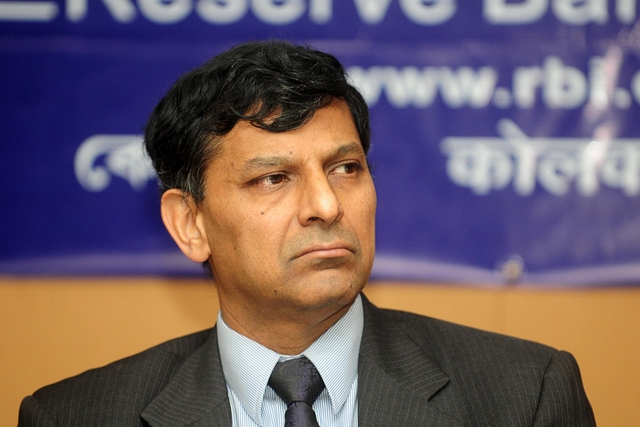
Rajan Is Sounding Like A Stuck Record On DeMo & GST: He Should Move On
Rajan had the ability to force the tide to recede earlier when he was in government, and also when he was governor of the central bank later.
But beyond making comments about bank lending practices, he did not do much to expose the nudity of bankers and businessmen at that time.
The more Raghuram Rajan talks, the less he sounds like the high-quality intellectual he was once touted to be. For a man who thought he was in line for one of the top jobs in government if a Congress-led UPA had come to power in 2019, Rajan’s recent utterances are sounding more like sour grapes than pearls of wisdom.
At a recent O P Jindal lecture at Brown University, his observations were like a stuck record, with Rajan making his usual critical comments on demonetisation, goods and services tax (GST) and the BJP government’s alleged “majoritarianism”.
“The sequence of demonetisation (DeMo) and GST was essentially the straw that seems to have broken the Indian economy's back because it came at a point when the Indian economy was relatively weak,” he is quoted as saying.
He added: “Ill-conceived demonetisation and the poorly executed GST rollout were the two key reasons behind the slowdown.”
Let’s accept that DeMo wasn’t a great idea but that happened more than three years ago, and the economy has since been fully monetised and new forms of digital payments have reduced frictions in the payment system like never before.
To harp on DeMo when it is no longer the issue sounds dubious. It’s no better than Indians today blaming the British for our economic or social problems.
His critique is even less valid in the case of GST, which is admittedly sub-optimal and in need of major surgery. But no one is more concerned about it than the Modi government and Finance Minister Nirmala Sitharaman.
The UPA government that Rajan served had umpteen chances to implement an “ideal” GST but failed to do so. Why didn’t it happen then?
The answer lies in India’s federal system and our system of extreme adversarial politics, where consensus is difficult to reach. If GST happened under Modi, it is only because a consensus was evolved by promising states a huge 14 per cent annual growth in revenues come what may.
The complexity of the current GST system – high and multiple rates and a cess – was partly necessitated by this promise. The political reality is that if states had not been enticed with promises of high revenue growth, they would not have signed up for GST.
Rajan should know enough about India to note that the ideal cannot be made the enemy of the good. A winning GST formula does not happen purely by design and at first crack. It emerges from trial and error.
The messy compromises needed to find consensus automatically militates against ideal design for any tax, leave alone a complex system like GST. This has happened with all taxes, from Cenvat to state VAT. All of them took years to stabilise.
While it is possible to assign some of the blame to both DeMo and GST for the current slowdown, Rajan is surely wrong to think of these two disruptions as primary causes.
The slowdown began much earlier, and many underlying problems did not surface when he was at the helm in the Reserve Bank of India (RBI) because the old, corrupt system covered it up.
Rajan was more candid last year in admitting that the bulk of the bad loans problem related to irresponsible lending occurred during the 2006-08 period of the UPA, and so he too must share the blame for the problem when he was Chief Economic Advisor in 2012, and became Reserve Bank Governor in 2013-16.
There is, in fact, another way of looking at DeMo and GST, not to speak of the Modi government’s drive against cronyism with the legislation of the Insolvency and Bankruptcy Code (IBC).
DeMo and GST certainly delivered shocks to the system, but it was these shocks that forced bankers and businesses to finally admit the real scale of their bad loans problem.
Iconic investor Warrant Buffet produced a pearl of wisdom after the 2008 global financial meltdown, which is very valid in the Indian context. “You only find out who is swimming naked when the tide goes out,” said Buffett. The follies of the large financial behemoths got exposed only after the Lehman crisis.
In India, that happened with DeMo, GST and IBC, when cronies could not anymore rely on friendly bankers and telephone calls from Delhi to cover their financial nudity.
Rajan had the ability to force the tide to recede earlier when he was in government, and also when he was governor of the central bank later. But beyond making comments about bank lending practices, he did not do much to expose the nudity of bankers and businessmen at that time.
He was probably happy to cover the vital parts because a government he liked was in power. Now that a government he dislikes is in power, he can pretend to be the oracle of clear-sighted intellectualism.
Thanks, but no thanks. Rajan’s wisdom is not looking too different from 20/20 hindsight.
The NDA under Modi may have misjudged the gravity of the financial crisis when it came to power in 2014, and till recently, it may also have misjudged the seriousness of the economic headwinds it was facing, but at least it is now coming to grips with it.
DeMo and GST may have aggravated the crisis, but they have also forced a major turnaround in economic thinking in the Modi government. The government is no longer in denial about the seriousness of the challenges it faces.